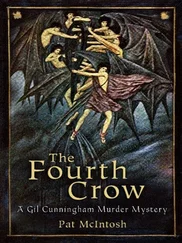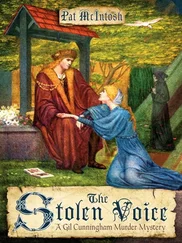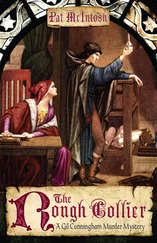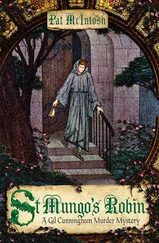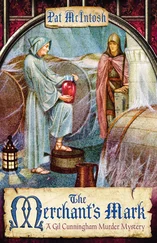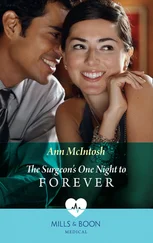Pat McIntosh - The Harper's Quine
Здесь есть возможность читать онлайн «Pat McIntosh - The Harper's Quine» весь текст электронной книги совершенно бесплатно (целиком полную версию без сокращений). В некоторых случаях можно слушать аудио, скачать через торрент в формате fb2 и присутствует краткое содержание. Жанр: Исторический детектив, на английском языке. Описание произведения, (предисловие) а так же отзывы посетителей доступны на портале библиотеки ЛибКат.
- Название:The Harper's Quine
- Автор:
- Жанр:
- Год:неизвестен
- ISBN:нет данных
- Рейтинг книги:5 / 5. Голосов: 1
-
Избранное:Добавить в избранное
- Отзывы:
-
Ваша оценка:
- 100
- 1
- 2
- 3
- 4
- 5
The Harper's Quine: краткое содержание, описание и аннотация
Предлагаем к чтению аннотацию, описание, краткое содержание или предисловие (зависит от того, что написал сам автор книги «The Harper's Quine»). Если вы не нашли необходимую информацию о книге — напишите в комментариях, мы постараемся отыскать её.
The Harper's Quine — читать онлайн бесплатно полную книгу (весь текст) целиком
Ниже представлен текст книги, разбитый по страницам. Система сохранения места последней прочитанной страницы, позволяет с удобством читать онлайн бесплатно книгу «The Harper's Quine», без необходимости каждый раз заново искать на чём Вы остановились. Поставьте закладку, и сможете в любой момент перейти на страницу, на которой закончили чтение.
Интервал:
Закладка:
‘I will, sir.’
‘And that reminds me. I have a task for you. You mind the Archbishop’s new work? Where he’s decided to complete the Fergus Aisle?’ Gil nodded, biting into his apple. ‘It seems St Mungo’s is not big enough now we’re an archdiocese. Christ save us, is it only four months since the Nuncio was here? Anyway, the mason wants a word with one of the Chapter, I suppose to talk about some detail or other. You might as well deal with it. Don’t promise the Chapter to any expenditure — or the Bishop either.’
‘I won’t.’
‘Before the mom’s work starts, he said, after Lauds.’ The Official took his hands from the board as the stable-lads lifted it off the trestles. ‘Have you found the Sempill disposition yet? I want to see it tonight.’
Compline, that folding-together of the hands at the day’s end, was always a satisfactory service. In the vaulted sacristy, where fingers of late gold sunlight poked through the northward windows, David Cunningham accepted his vestments one by one from Gil, and finally bent his head under the yoke of his own stole from the bundle Gil had carried over before Vespers. He paused for a moment, his lips moving, then said, ‘I’ll disrobe myself, Gilbert. You may hear the service or go, as you please.’
‘I’ll hear it, I think, sir,’ said Gil politely. He knelt for his uncle’s blessing, and slipped out into the nave.
This late in the evening those present were principally servants or dependants of the cathedral community, more familiar to Gil than the habitants of the lower town. Maggie Baxter was there, with her friend Agnes Dow who kept house for the sub-chanter. Adam Goudie’s sister Ann, who ran the sub-Thesaurer’s household, the Canon himself and some said his share of the Treasury too, had a new gown of tawny wool in honour of the May. Beyond them a flash of black-and-gold caught Gil’s eye.
Shifting position he saw John Sempill, with some of the party he had seen ride past the Tolbooth: Sempill’s handsome cousin, and also the small dark fellow and one of the men-at-arms, and furthest away, beyond her stout companion, Lady Euphemia Campbell, small and fragile in sapphire-blue with her golden hair rippling from under a velvet hat like a man’s. Another quotation popped into his head, from the bawdy tale of the Friars of Berwick: A fair blyth wyf … sumthing dynk and dengerous. Was such a dainty lady dangerous? he wondered.
At his movement she glanced his way, and smiled at him, then returned to her prayers. Her actions as she stood or knelt, crossed herself, bent her head over her beads, were fluid and graceful, and Gil watched, fascinated, hoping she would look his way again. Beyond the massive stone screen the Vicars Choral launched into the evening psalms. Down here in the nave the other man-at-arms came in with a word for his master, and behind him another expensively dressed man joined the group, hiding Lady Euphemia from his view.
For a while Gil paid attention to the singing; then, as if to a lodestone, he found his glance drawn in that direction again. One of the men was just slipping away to another altar, but it was almost with relief that he found Euphemia Campbell’s slight person was still invisible.
When the Office ended and the choir had filed through the narrow door in the screen and back into the vestry, the church slowly emptied. Gil paused by the altar of St Giles to leave money for candles. Earlier the image had glowed in red and gold light from the west windows, and the hind at the saint’s side had been resplendent in a coat of many colours, but now the sun had moved round St Giles and his pet stood in their workaday brown and white paint. The holiday was over. Tomorrow, Gil thought, I must go back to the Monteath petition. His heart sank at the notion. Sweet St Giles, he said silently to the remote image, give me strength to face what is set before me.
After a moment he made for the south door. As he reached it Euphemia Campbell rose from her knees before the altar of St Catherine, crossed herself with that distracting grace, and moved towards the door herself. Gil held it open, bowing, and she favoured him with a luminous, speculative smile and went out before him.
Following her, he paused on the door-sill to look around. To the right, the Sempill party was gathering itself together, Sempill himself emerging from a nearby clump of trees scowling and fiddling with his codpiece. Lady Euphemia strolled gracefully towards him and put her hand possessively on his arm. The whole party made for the gate, except for the small sallow man, who stood for a moment longer staring after Euphemia Campbell, one hand on his dagger. Then, as she turned to look over her shoulder, he shied like a startled horse and scurried after her.
Gil stood where he was, admiring the evening. He had no wish to accompany John Sempill and his friends the quarter-mile or so back to the two houses which faced one another across Rottenrow. The kirkyard was in shade, only the high crowns of the trees still catching the light. Before Vespers there had been people about, talking or singing. Someone had been playing a lute, a group of children danced in a ring, their voices sweet on the warm air, and Gil had caught a glimpse of the two youngsters he had seen earlier at the Cross, the boy’s striped hose conspicuous under the trees. The children had been called home now, the lutenist had gone to find a more financially rewarding audience, and only a last few parishioners drifted up the path towards the gate.
To the left, against the pale bulk of the cathedral itself, the Archbishop’s new work was in shadow. Robert Blacader, Bishop of Glasgow, now since last January Archbishop of Glasgow, wanted to elaborate his cathedral, and his eye had fallen on the Fergus Aisle. If one was precise about it, the little chapel off the south transept was not new work, but something started more than a hundred years ago over the burial-place of that holy man Fergus whose death had brought the young Kentigern to his dear green place. It had been soon abandoned, probably when the Chapter of the day ran out of money, the foundations open to the weather ever since.
Gil considered the building site. The walls had now reached shoulder-height, and stood surrounded by stacks of timber for the scaffolding. A neat row of blocks of stone waited to be cut to shape in the masons’ lodge whose thatched roof Gil could see beyond the chapel. Hurdles supported on more scaffolding made a ramp for a wheelbarrow. Tomorrow he must meet the master mason there.
The Sempill party had left the kirkyard. Patting his purse, which was significantly heavier for the evening’s card-play, Gil set off for home. Several of the songmen thought they could play Tarocco, but had not learned the game, as he had, from the card-players of Paris.
He wondered later how much difference it would have made if he had gone to look in the building site then, rather than in the morning.
Chapter Two
It was surprising how much of the singing one could hear, sitting shivering outside the cathedral at five o’clock in the morning, trying very hard to remember whether a building site was consecrated ground or not.
Here in the kirkyard the birds were shouting. Inside, the Vicars Choral had dealt with Matins and were cantering through Lauds, with more attention paid to speed than sense. A lot of the sound came through the windows, but a certain amount of it, Gil reasoned, came by the door which used to be the south transept entrance and now stood firmly shut and locked above the muddy grass of the Fergus Aisle, quite near to where someone had recently been sick, and just above where the dead woman was lying.
He sat on the scaffolding, fingering his beads and staring at her. She had given him a most unpleasant turn. Coming out early to meet the mason, since he was awake anyway and there was no chance of breaking his fast until Maggie got the fire going, he had climbed up the wheelbarrow ramp and into the chapel to have the closer look he had passed over last night, and there she was, lying half under the planks by the far wall. He had thought at first she was asleep, or drunk, until he smelled the blood; and then he had touched her shoulder and found it rigid under his hand.
Читать дальшеИнтервал:
Закладка:
Похожие книги на «The Harper's Quine»
Представляем Вашему вниманию похожие книги на «The Harper's Quine» списком для выбора. Мы отобрали схожую по названию и смыслу литературу в надежде предоставить читателям больше вариантов отыскать новые, интересные, ещё непрочитанные произведения.
Обсуждение, отзывы о книге «The Harper's Quine» и просто собственные мнения читателей. Оставьте ваши комментарии, напишите, что Вы думаете о произведении, его смысле или главных героях. Укажите что конкретно понравилось, а что нет, и почему Вы так считаете.


